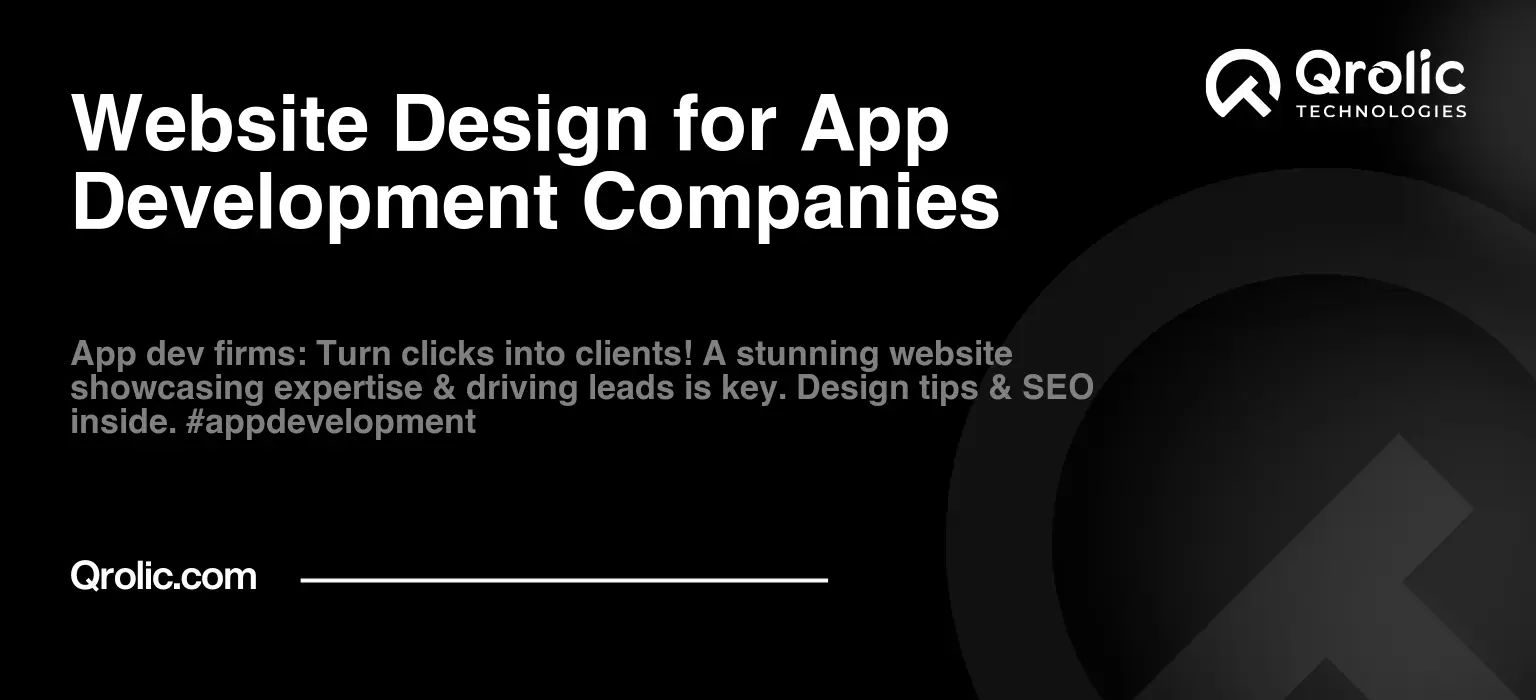Quick Summary:
- A professional website is vital for app development companies.
- Plan your site, include key pages, and ensure great design.
- Optimize for search engines, promote, and track your performance.
Table of Contents
- Why Your App Development Company Needs a Killer Website
- The Website as Your Digital Business Card
- The Consequences of a Neglected Website
- Defining Your Website’s Purpose and Goals
- Identifying Your Target Audience
- Setting Measurable Goals (SMART Goals)
- Key Questions to Ask Yourself
- Essential Website Pages for App Development Companies
- 1. Homepage: Your Digital First Impression
- 2. About Us: Tell Your Story
- 3. Services: Showcase Your Expertise
- 4. Portfolio: Showcase Your Best Work
- 5. Case Studies: In-Depth Project Analysis
- 6. Blog: Establish Thought Leadership
- 7. Contact Us: Make it Easy to Connect
- 8. Pricing (Optional): Transparency and Clarity
- Designing a User-Friendly and Visually Appealing Website
- User Experience (UX) Design Principles
- Visual Design Elements
- Choosing the Right Website Platform
- Optimizing Your Website for Search Engines (SEO)
- Keyword Research
- On-Page Optimization
- Off-Page Optimization
- Technical SEO
- Qrolic Technologies: Your Partner in App Development
- Why Choose Qrolic Technologies?
- Our App Development Services
- How Qrolic Technologies Can Help You
- Measuring Your Website’s Performance
- Key Performance Indicators (KPIs)
- Analytics Tools
- Regular Monitoring and Analysis
- Promoting Your Website
- Digital Marketing Strategies
- Offline Marketing Strategies
- Staying Up-to-Date
- Industry Blogs and Publications
- Conferences and Events
- Continuous Learning
Why Your App Development Company Needs a Killer Website
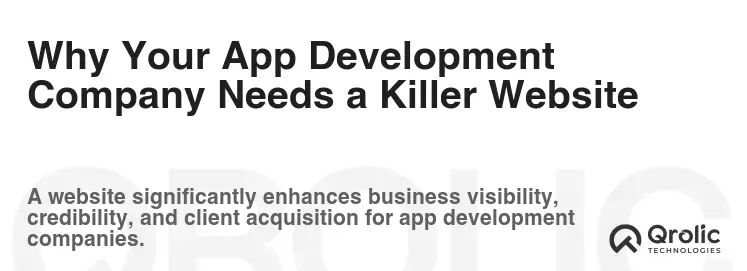
In today’s digital landscape, your website is more than just an online brochure; it’s the digital storefront, the 24/7 salesperson, and the first impression you make on potential clients. For an app development company, a compelling website is absolutely essential. It’s the cornerstone of your online presence and a crucial factor in attracting leads, building trust, and ultimately, winning projects. Think of it this way: your website is your most valuable employee.
The Website as Your Digital Business Card
- First Impressions Matter: In the blink of an eye, visitors will judge your credibility based on your website’s design and usability. A professional, modern, and user-friendly website demonstrates competence and attention to detail, qualities highly sought after in an app development partner.
- Showcase Your Expertise: A well-crafted website allows you to showcase your app development skills, experience, and expertise. Detailed case studies, compelling portfolio pieces, and insightful blog posts establish you as a thought leader and demonstrate your capabilities.
- Generate Qualified Leads: Your website is a lead generation machine. Strategic calls to action (CTAs), contact forms, and lead magnets (e.g., free e-books, webinars) capture visitor information and nurture them into potential clients.
- Build Trust and Credibility: Testimonials, client logos, and industry certifications displayed prominently on your website build trust and credibility. They serve as social proof, demonstrating that you’ve successfully delivered results for other clients.
- Communicate Your Value Proposition: Clearly articulate the unique benefits of working with your app development company. What sets you apart from the competition? What problems do you solve? Your website is the perfect platform to convey your value proposition.
- Control Your Narrative: Your website allows you to control the narrative around your brand. You can present your company’s story, mission, and values in a way that resonates with your target audience.
- Provide Essential Information: Visitors need easy access to information about your services, pricing (if possible), team members, and contact details. A well-organized website provides all the information a potential client needs to make an informed decision.
The Consequences of a Neglected Website
A poorly designed or outdated website can severely damage your app development company’s reputation. It can signal a lack of attention to detail, a failure to keep up with industry trends, and a general lack of professionalism. This can lead to missed opportunities and lost revenue.
- Losing Potential Clients: A confusing or unattractive website will drive visitors away, sending them straight to your competitors.
- Damage to Your Reputation: A poorly designed website can undermine your credibility and make you appear unprofessional.
- Missed Lead Generation Opportunities: Without effective CTAs and lead capture mechanisms, you’re missing out on valuable leads.
- Difficulty Ranking in Search Engines: A website that isn’t optimized for search engines will be difficult to find, limiting your online visibility.
- Increased Customer Acquisition Costs: Without a strong online presence, you’ll need to rely on more expensive marketing channels to attract clients.
Defining Your Website’s Purpose and Goals

Before diving into the design and development process, it’s crucial to define your website’s purpose and goals. What do you want to achieve with your website? Who is your target audience? Answering these questions will guide your website’s content, design, and functionality.
Identifying Your Target Audience
Understanding your target audience is paramount. Are you targeting startups, small businesses, or large enterprises? Are you specializing in specific industries (e.g., healthcare, finance, e-commerce)? The answers to these questions will influence your website’s language, imagery, and overall messaging.
- Create Buyer Personas: Develop detailed profiles of your ideal clients, including their demographics, job titles, pain points, and goals. This will help you tailor your website’s content to resonate with their specific needs.
- Conduct Market Research: Research your target audience’s online behavior. What websites do they visit? What keywords do they use when searching for app development services? This information will inform your SEO strategy.
- Analyze Your Existing Clients: Study your existing client base to identify common characteristics and pain points. This will help you refine your target audience profile and improve your website’s messaging.
Setting Measurable Goals (SMART Goals)
Establish specific, measurable, achievable, relevant, and time-bound (SMART) goals for your website. This will allow you to track your progress and measure the effectiveness of your website.
- Increase Website Traffic: Set a goal to increase website traffic by a certain percentage within a specific timeframe.
- Generate Leads: Aim to generate a certain number of qualified leads per month through your website.
- Improve Conversion Rates: Focus on improving the percentage of website visitors who convert into leads or clients.
- Increase Brand Awareness: Track your website’s visibility in search engine results and social media mentions.
- Improve Customer Satisfaction: Monitor customer feedback and reviews to assess the impact of your website on customer satisfaction.
Key Questions to Ask Yourself
- What is the primary purpose of your website? (e.g., lead generation, brand awareness, online sales)
- Who is your target audience? (e.g., startups, small businesses, enterprises)
- What are your key performance indicators (KPIs)? (e.g., website traffic, lead generation, conversion rates)
- What is your budget for website design and development?
- What is your timeline for launching your website?
- Who will be responsible for maintaining and updating the website?
Essential Website Pages for App Development Companies
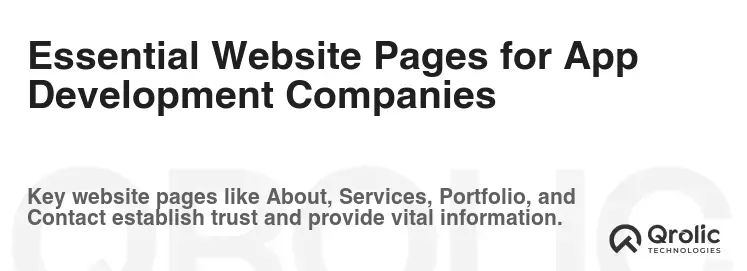
Every app development company website should include certain essential pages to effectively communicate its value proposition, showcase its expertise, and generate leads.
1. Homepage: Your Digital First Impression
The homepage is the most important page on your website. It’s your opportunity to make a strong first impression and capture visitors’ attention.
- Compelling Headline: Use a clear and concise headline that communicates your value proposition.
- High-Quality Visuals: Use professional photos and videos to showcase your work and team.
- Clear Call to Action (CTA): Guide visitors to take the next step, such as requesting a quote or contacting you.
- Brief Overview of Services: Highlight your key app development services and areas of expertise.
- Social Proof: Include testimonials, client logos, and industry awards.
- Easy Navigation: Ensure that your website is easy to navigate and that visitors can quickly find the information they’re looking for.
2. About Us: Tell Your Story
The “About Us” page allows you to tell your company’s story, share your mission and values, and introduce your team.
- Company History: Share your company’s history and milestones.
- Mission and Values: Clearly articulate your company’s mission and core values.
- Team Introduction: Introduce your team members and highlight their expertise.
- Company Culture: Showcase your company culture and values.
- Humanize Your Brand: Use photos and videos to humanize your brand and make it more relatable.
3. Services: Showcase Your Expertise
The “Services” page provides a detailed overview of your app development services.
- Comprehensive Service List: List all of your app development services, including mobile app development (iOS and Android), web app development, UI/UX design, and quality assurance.
- Detailed Service Descriptions: Provide detailed descriptions of each service, highlighting the benefits and features.
- Targeted Content: Tailor the content to address the specific needs of your target audience.
- Case Studies: Include case studies that showcase your expertise in specific areas.
- Clear Call to Action (CTA): Encourage visitors to request a quote or learn more about your services.
4. Portfolio: Showcase Your Best Work
The “Portfolio” page showcases your best app development projects and demonstrates your capabilities.
- High-Quality Images and Videos: Use high-quality images and videos to showcase your work.
- Detailed Project Descriptions: Provide detailed descriptions of each project, including the challenges you faced, the solutions you implemented, and the results you achieved.
- Client Testimonials: Include client testimonials that highlight the success of your projects.
- Filter and Search Functionality: Allow visitors to filter and search for projects based on industry, technology, or service.
- Showcase a Variety of Projects: Showcase a variety of projects to demonstrate your versatility.
5. Case Studies: In-Depth Project Analysis
Case studies provide in-depth analysis of your app development projects, demonstrating your problem-solving skills and the value you deliver to clients.
- Problem Statement: Clearly define the problem that the client was facing.
- Solution Implemented: Describe the solution you implemented to address the problem.
- Results Achieved: Quantify the results achieved, such as increased revenue, improved efficiency, or enhanced customer satisfaction.
- Client Testimonial: Include a client testimonial that highlights the success of the project.
- Visual Aids: Use charts, graphs, and images to illustrate the results achieved.
6. Blog: Establish Thought Leadership
A blog is a powerful tool for establishing thought leadership, attracting organic traffic, and engaging with your target audience.
- High-Quality Content: Publish high-quality, informative, and engaging blog posts on topics related to app development.
- Target Keywords: Optimize your blog posts for relevant keywords to improve your search engine ranking.
- Regular Updates: Publish new blog posts on a regular basis to keep your audience engaged.
- Promote Your Blog: Promote your blog posts on social media and through email marketing.
- Guest Blogging: Consider guest blogging on other websites in your industry to reach a wider audience.
7. Contact Us: Make it Easy to Connect
The “Contact Us” page should make it easy for visitors to connect with you.
- Contact Form: Include a contact form that allows visitors to submit their inquiries.
- Phone Number and Email Address: Display your phone number and email address prominently.
- Address: Include your company’s address.
- Map: Embed a map to show your location.
- Social Media Links: Include links to your social media profiles.
- Clear Call to Action (CTA): Encourage visitors to contact you for a free consultation or quote.
8. Pricing (Optional): Transparency and Clarity
While pricing can be complex in app development, providing some level of transparency can be beneficial.
- Project-Based Pricing Examples: Offer examples of past projects and their associated costs to provide a general idea of pricing.
- Hourly Rate Information: If applicable, display your hourly rates for different services.
- Factors Influencing Pricing: Explain the factors that influence pricing, such as project complexity, features, and technology stack.
- Quote Request Form: Include a form that allows visitors to request a customized quote for their project.
- Highlight Value: Emphasize the value you provide and the return on investment (ROI) that clients can expect.
Designing a User-Friendly and Visually Appealing Website
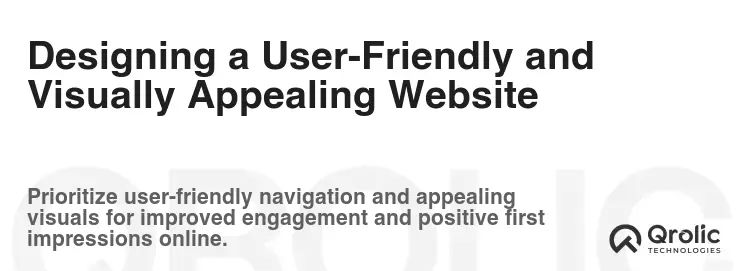
Your website’s design is crucial for attracting and retaining visitors. A user-friendly and visually appealing website will create a positive user experience and encourage visitors to explore your content.
User Experience (UX) Design Principles
- Intuitive Navigation: Ensure that your website is easy to navigate and that visitors can quickly find the information they’re looking for.
- Clear Hierarchy: Use headings, subheadings, and bullet points to organize your content and create a clear hierarchy.
- Mobile-Friendly Design: Ensure that your website is responsive and optimized for mobile devices.
- Fast Loading Speed: Optimize your website for speed to ensure a fast loading time.
- Accessibility: Design your website to be accessible to users with disabilities.
Visual Design Elements
- Color Palette: Choose a color palette that is consistent with your brand and creates a visually appealing aesthetic.
- Typography: Use fonts that are easy to read and complement your brand.
- Imagery: Use high-quality photos and videos that showcase your work and team.
- Whitespace: Use whitespace effectively to create a clean and uncluttered design.
- Consistency: Maintain consistency in design elements across all pages of your website.
Choosing the Right Website Platform
- WordPress: A popular and versatile platform with a wide range of themes and plugins. It’s a good option for businesses of all sizes, particularly if you want to prioritize content marketing through a blog.
- Webflow: A design-focused platform that allows you to create custom websites without coding. It’s a good option for businesses that want a highly customized design.
- Squarespace: A user-friendly platform that is easy to set up and manage. It’s a good option for small businesses with limited technical expertise.
- Custom Development: If you have unique requirements or want a highly customized website, you can hire a web development agency to build a custom website.
Optimizing Your Website for Search Engines (SEO)
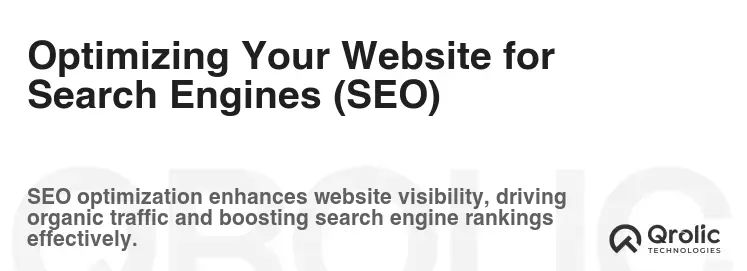
Search engine optimization (SEO) is crucial for attracting organic traffic to your website. By optimizing your website for relevant keywords, you can improve your search engine ranking and increase your online visibility.
Keyword Research
- Identify Relevant Keywords: Use keyword research tools to identify relevant keywords that your target audience is searching for.
- Focus on Long-Tail Keywords: Target long-tail keywords (longer, more specific phrases) to attract highly qualified traffic.
- Analyze Competitor Keywords: Analyze your competitors’ websites to identify the keywords they are targeting.
On-Page Optimization
- Title Tags: Optimize your title tags with relevant keywords.
- Meta Descriptions: Write compelling meta descriptions that encourage users to click on your website in search results.
- Header Tags (H1-H6): Use header tags to structure your content and highlight important keywords.
- Content Optimization: Optimize your content with relevant keywords and provide valuable information to your audience.
- Image Optimization: Optimize your images with descriptive alt text and compress them to improve loading speed.
- Internal Linking: Link to other relevant pages on your website to improve navigation and SEO.
Off-Page Optimization
- Link Building: Build high-quality backlinks from other websites to improve your website’s authority.
- Social Media Marketing: Promote your website on social media to increase brand awareness and drive traffic.
- Online Directories: List your website in relevant online directories.
- Guest Blogging: Contribute guest posts to other websites in your industry to build backlinks and reach a wider audience.
Technical SEO
- Website Speed: Ensure that your website loads quickly to improve user experience and SEO.
- Mobile-Friendliness: Ensure that your website is responsive and optimized for mobile devices.
- Sitemap: Create a sitemap and submit it to search engines.
- Robots.txt: Use a robots.txt file to control which pages of your website are crawled by search engines.
- SSL Certificate: Install an SSL certificate to secure your website and improve your search engine ranking.
Qrolic Technologies: Your Partner in App Development

At Qrolic Technologies (https://qrolic.com/), we understand the importance of a strong online presence for app development companies. We offer comprehensive app development services that can help you build a successful business.
Why Choose Qrolic Technologies?
- Expert App Developers: Our team of experienced app developers has a proven track record of delivering high-quality apps.
- Custom App Development: We offer custom app development services tailored to your specific needs and requirements.
- UI/UX Design: Our UI/UX designers create user-friendly and visually appealing app interfaces.
- Quality Assurance: We conduct rigorous quality assurance testing to ensure that your app is bug-free and performs flawlessly.
- Agile Development: We use agile development methodologies to ensure that your project is delivered on time and within budget.
- Ongoing Support: We provide ongoing support and maintenance to ensure that your app remains up-to-date and performs optimally.
Our App Development Services
- iOS App Development: We develop high-quality iOS apps for iPhones and iPads.
- Android App Development: We develop robust Android apps for smartphones and tablets.
- Web App Development: We develop responsive web apps that can be accessed from any device.
- Cross-Platform App Development: We develop cross-platform apps that can run on both iOS and Android devices.
- UI/UX Design: We create user-friendly and visually appealing app interfaces.
- Quality Assurance: We conduct rigorous quality assurance testing to ensure that your app is bug-free.
How Qrolic Technologies Can Help You
- Build a Strong Online Presence: We can help you build a website that showcases your app development expertise and attracts potential clients.
- Develop High-Quality Apps: We can develop high-quality apps that meet your specific needs and requirements.
- Improve User Experience: We can help you improve the user experience of your apps to increase user engagement and retention.
- Increase Revenue: We can help you increase revenue through app monetization strategies.
- Grow Your Business: We can help you grow your business by providing innovative app development solutions.
Measuring Your Website’s Performance
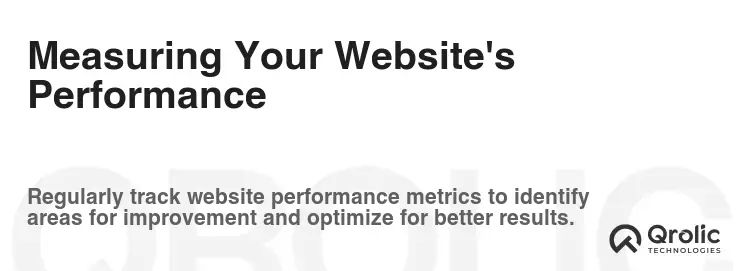
It’s essential to track your website’s performance to measure its effectiveness and identify areas for improvement.
Key Performance Indicators (KPIs)
- Website Traffic: Track the number of visitors to your website.
- Bounce Rate: Measure the percentage of visitors who leave your website after viewing only one page.
- Time on Site: Track the average amount of time visitors spend on your website.
- Conversion Rate: Measure the percentage of website visitors who convert into leads or clients.
- Lead Generation: Track the number of leads generated through your website.
- Search Engine Ranking: Monitor your website’s ranking in search engine results.
Analytics Tools
- Google Analytics: A free and powerful tool for tracking website traffic, user behavior, and conversions.
- Google Search Console: A free tool for monitoring your website’s performance in Google search results.
- Other Analytics Tools: Explore other analytics tools to gain deeper insights into your website’s performance.
Regular Monitoring and Analysis
- Track Your KPIs: Track your KPIs on a regular basis to identify trends and patterns.
- Analyze Your Data: Analyze your data to identify areas for improvement.
- Make Adjustments: Make adjustments to your website based on your analysis.
- Continuous Improvement: Continuously monitor and analyze your website’s performance to ensure that it’s meeting your goals.
Promoting Your Website

Once your website is live, it’s important to promote it to attract traffic and generate leads.
Digital Marketing Strategies
- Search Engine Optimization (SEO): Optimize your website for search engines to improve your organic ranking.
- Social Media Marketing: Promote your website on social media to increase brand awareness and drive traffic.
- Email Marketing: Build an email list and send regular newsletters to your subscribers.
- Content Marketing: Create valuable content that attracts and engages your target audience.
- Pay-Per-Click (PPC) Advertising: Run paid advertising campaigns on search engines and social media platforms.
- Online Directories: List your website in relevant online directories.
Offline Marketing Strategies
- Business Cards: Include your website address on your business cards.
- Brochures: Include your website address in your brochures.
- Networking Events: Promote your website at networking events.
- Partnerships: Partner with other businesses in your industry to promote each other’s websites.
By following these strategies, you can effectively promote your website and attract a steady stream of qualified leads.
Staying Up-to-Date

The digital landscape is constantly evolving, so it’s important to stay up-to-date with the latest trends and technologies.
Industry Blogs and Publications
- Read Industry Blogs: Subscribe to industry blogs to stay informed about the latest trends and best practices.
- Follow Industry Publications: Follow industry publications to stay up-to-date on the latest news and developments.
Conferences and Events
- Attend Conferences: Attend industry conferences to network with other professionals and learn about the latest trends.
- Attend Webinars: Attend webinars to learn about specific topics and gain insights from industry experts.
Continuous Learning
- Take Online Courses: Take online courses to learn new skills and improve your expertise.
- Experiment with New Technologies: Experiment with new technologies to stay ahead of the curve.
By staying up-to-date, you can ensure that your website remains relevant and effective.
Creating an effective app development company website is an ongoing process. By following the strategies outlined in this article, you can build a website that attracts leads, builds trust, and helps you grow your business. Remember to prioritize user experience, optimize for search engines, and continuously monitor and improve your website’s performance. Good luck!

